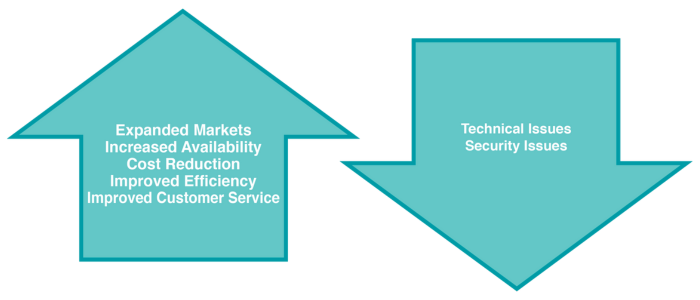13.2 E-Commerce Advantages and Disadvantages
It is important to understand the advantages and disadvantages of this model compared to traditional brick-and-mortar businesses. Businesses need to understand their customers and their needs as well as the value of this model.

Advantages
Expanded Markets
Businesses with an online presence are not limited to servicing customers in their immediate geographic area only, and can broaden their market to serve customers at greater distances, even globally. The business would be limited only by shipping methods and costs and would need to consider this in their setup.
Increased Availability
Online operations allow businesses to interact and transact with customers all day every day, and are no longer limited to traditional bricks and mortar operating hours. This makes it easy for customers to make their purchases at a time that is convenient for them. As well, the automation of the online site means that a business can expand operating hours without necessarily increasing labour costs. As well, there are no limitations on shelf space making it possible to expand product offerings.
Reduce Costs
There are many ways that online technology can be utilized by businesses to reduce costs. For a traditional brick and mortar business, by moving online they can save on all of the infrastructure costs of having a physical presence, such as rent, utilities, and maintenance. As well, since online businesses are not limited to shelf space, they can provide expanded product offerings to their customers without the added costs of stocking in store. For businesses that manufacture goods they can use an online site to transact directly with their customers and remove any need for a retailer (intermediary). The elimination of an intermediary is referred to as disintermediation. An example of this is Dell Direct. As well, instead of drawing employees from their local area, organizations can now hire people from the global labour pool. This allows organizations to pay a lower labour cost for the same work based on the prevailing wage in different countries.
Improved Efficiency
When processes are done online or digitally as opposed to more traditional approaches like paper based, the business benefits through efficiency. For example, online ordering allows customers to create accounts and enter in their own information which can reduce errors and speed processes like ordering and payment. This allows the business to track their customers and their shopping habits which can benefit them in the future.
Improved Customer Service
Customers are able to connect with businesses online in different ways which can improve customer satisfaction. Some businesses even have chatbots that allow customers to ask questions and receive immediate answers based on similar questions asked before. As well, customers can leave reviews and have the opportunity to provide feedback to businesses online about their satisfaction with their products and services. Some businesses have made the online return process fairly simple by automating the process and allowing customers to print return labels and drop in the mail.
The amount of data collected digitally on customers as they are interacting with the website is extremely valuable as well. This information can be used to help encourage further purchases or to help target new customers. Many sites use algorithms to suggest similar products when purchasing online to upsell the customer.
While e-commerce provides a number of advantages there are also some disadvantages with this method of doing business.
Disadvantages
Technical & Accessibility issues
Around the world customers may still experience bandwidth issues that prevent them from being able to efficiently interact with businesses online. Bandwidth and access issues will not be a problem in the future as more infrastructure is built.
Security & Privacy Issues
Customers may still be wary about shopping online especially when large privacy breaches have been well publicized. According to the Canadian Internet Use Survey looking at the online shopping habits of Canadians in 2020, for those Canadians who don’t shop online, close to a quarter stated that it is due to security and privacy reasons (Statistics Canada, 2021).
Establishing Customer Trust & Satisfaction
Trust is about believing that someone will do what they say and that they will not intentionally do something to hurt you. Trust in business is essential and it is easier to establish in the physical world as customers receive cues from the environment as well as body language from the sales staff. In the online environment, businesses can help build trust by ensuring customers have a good experience by making their online platform easy to navigate and use. Their website presentation should also be high quality and free from errors. They can also provide reviews on other customers experiences.
Fake Reviews

Since online reviews of a company’s products and services have been found to generate online sales, the prevalence of fake reviews has proliferated. According to estimates, 4% of all online reviews are fake which equates to an impact on global online spending of $152 billion. Fake reviews are often created by bots which allows companies to leverage security systems to filter and remove this type of activity. Removing fake reviews is important for a company’s authenticity and helps to build and maintain customer trust (Marciano, 2021).
To build trust, businesses should also make sure the product or service meets the customers expectations. Customers may be dissatisfied especially when ordering products online if the product is not reliable, or different than expected. Meaning that the display and description of the product on the website is not what they received. Online retailers should provide a complete and realistic description of the product and its benefits—with high-quality pictures and perhaps even demonstration videos if possible, appropriate, and affordable—along with product availability and likely ship dates. Customers should be notified by e-mail of order acceptance, and the anticipated delivery date with phone and e-mail contacts for any needed assistance.
Information Systems for Business and Beyond: 10.3 by Shauna Roch; James Fowler; Barbara Smith; and David Bourgeois is licensed under a Creative Commons Attribution-NonCommercial-ShareAlike 4.0 International License, except where otherwise noted.

